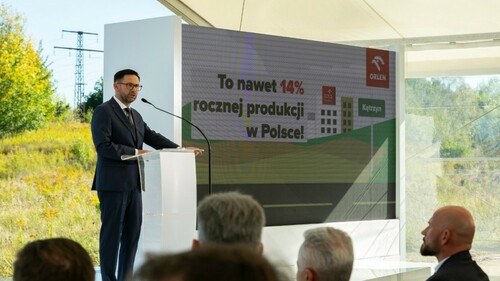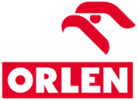ORLEN Group will build its own oil pressing plant in Kętrzyn, Poland
ORLEN Południe, part of the ORLEN Group, has signed a contract for the construction of a state-of-the-art oilseed processing plant in Kętrzyn (Province of Olsztyn). The plant is set to process 500 thousand tonnes of rapeseed annually, yielding a production output of 200 thousand tonnes of oil for the purpose of manufacturing low-carbon biofuels. This investment will not only generate employment opportunities but will also be a stable source of demand for Polish farmers cultivating the rapeseed crop.
‘We have an ambitious strategy to advance our biofuel production capabilities, a commitment that underscores the ORLEN Group’s aspiration to emerge as a dominant force in the regional biofuel sector. To further this vision, we are actively investing in our refineries in Trzebinia, Jedlicze, Płock and Gdańsk. The most recent project will involve the establishment of our own rapeseed oil pressing plant in Kętrzyn. With an annual processing capacity of 500 thousand tonnes of rapeseed, this facility is expected to utilise a substantial portion, approximately one-seventh, of the total domestic output of the crop. In our pursuit of business objectives, the ORLEN Group is dedicated to creating a conducive environment for sustained collaboration with Polish farmers, guaranteeing them a reliable outlet for the cultivated products. Also aligned with this commitment is our ongoing initiative involving the construction of a second-generation bioethanol plant in Jedlicze, set to consume 150 thousand tonnes of locally sourced straw from agricultural producers per year,’ says Daniel Obajtek, ORLEN’s CEO and President of the Management Board.
The pressing plant project in Kętrzyn will entail an estimated total cost of approximately PLN 850m. Its location has been influenced by the region’s remarkable agricultural potential and abundant availability of the raw material. Construction of the facility is to commence in the first half of 2024, with completion expected by mid-2026.In addition to the pressing plant itself, the complex will encompass various processing nodes, including facilities for raw material reception and product dispatch, raw material and product storage, pressing and extraction, process steam production, and wastewater treatment. The contractor responsible for the project will be a consortium of Polimex Mostostal S.A. and AB Industry S.A.
The plant is to produce an annual output of 200 thousand tonnes of oil, with ORLEN Południe having full control over the quality of the end product. In order to produce this amount of oil, the processing plant will use about 500 thousand tonnes of rapeseed sourced primarily from Polish agricultural producers. In 2022, Poland’s rapeseed crop yielded a total of 3.6 million tonnes.
The ORLEN Południe investment also heralds new prospects for the town and the wider region. The pressing plant alone will generate more than 100 new solid job opportunities, and its operation will stimulate demand for supplementary services that can be provided by local business.
Oil produced in Kętrzyn will meet the specifications required for use in the ORLEN Group’s production facilities. The principal consumer will be ORLEN Południe, which operates a biodiesel plant in Trzebinia.
Establishment of the Kętrzyn oil pressing plant underscores the ORLEN Group’s commitment to strengthening its collaboration with Polish farmers. Concurrently, a second-generation bioethanol plant is being constructed at the Jedlicze refinery, a pioneering development in Poland and the second of its kind in Europe. This facility is to produce 25 thousand tonnes of bioethanol annually, utilising non-food raw materials, primarily straw, sourced from Polish farmers in the quantity of 150 thousand tonnes per year.
Bio-components added to gasoline and diesel fuel play a role in diminishing our reliance on petroleum, thereby bolstering energy independence and augmenting the diversification of raw material sources for fuel production. This also holds significant environmental benefits, as bio-additives are either derived from renewable agricultural resources or facilitate the efficient management of waste, including post-consumer frying oils.
The ORLEN2030 strategy envisages that by the end of the decade the use of bio-additives in the ORLEN Group will reach about 3 million tons per year. To achieve this goal, the Group is prepared to invest over PLN 15bn. This expansion in biofuel production will be complemented by the production of biogas and biogas-derivative biomethane, which can serve as vital feedstock for biofuel manufacturing but also present themselves as standalone fuels capable of substituting natural gas. By 2030, the ORLEN Group aims to possess the capacity to produce 1 bcm of biogas annually, with total investments in excess of PLN 10bn.
ORLEN Południe stands as a leading producer of biofuels and bio-additives. Over the years, the company has consistently pursued a transformational journey to become a modern biorefinery. 2021 saw the launch of Poland’s first and Europe’s largest green glycol unit at the company’s refinery in Trzebinia. Additionally, ORLEN Południe has invested in a pilot plant dedicated to the production of lactic acid using microorganisms. Furthermore, the company has been actively engaged in advancing the hydrogen technology. In June 2022, Poland’s first hydrogen hub was launched at the Trzebinia plant, supplying hydrogen fuel for Kraków’s public transport buses.
Categories
Countries
Companies
Latest news
IPCEI funding approval paves way for progress at bp’s Lingen green hydrogen project
bp’s 100MW industrial-scale green hydrogen project awarded funding, provided jointly by BMWK and Lower-Saxony Government, as part of the European IPCEI (Important Projects of Common European intere...
German and state governments grant funding for large hydrogen projects by RWE at Lingen, Germany
Electrolyser plant in Lingen and hydrogen storage facility in Epe to be funded with a total of 619 million euros Rostock electrolysis project with RWE participation to receive 199 million euros F...
Europe’s first hydrogen fuelled power plant supporting the UK’s decarbonisation at Essars refinery in Stanlow, UK
EET Hydrogen Power announces the development of Europe’s first 100% hydrogen fuelled power plant. Hydrogen fuelled power is an essential part of decarbonisation of industry and the power system in ...
Boehringer Ingelheim produces its own green energy in Ingelheim, Germany
German Vice Chancellor and Federal Minister of Economics Robert Habeck inaugurates new biomass power plant Ingelheim site can cover 95% of its energy needs from renewable sources New power plant ...

